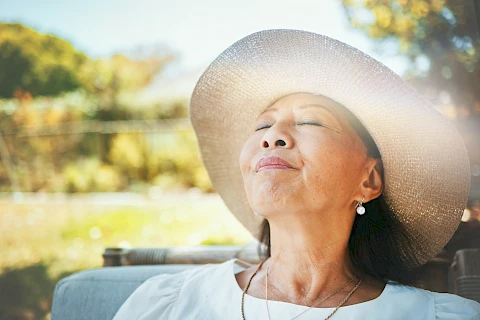
August marks Summer Sun Safety Month, a timely reminder to protect skin and health while enjoying sunny weather. As the skin ages, it becomes more sensitive to sun exposure, and some medications can increase this sensitivity further. For seniors, adopting thoughtful sun safety practices helps maintain comfort and well-being. Guidance on proper sunscreen use, selecting suitable protective clothing, and maintaining adequate hydration can support a safe and enjoyable time outdoors.
Why Seniors Need to Be Extra Vigilant
As we age, our skin becomes more sensitive to sunlight. This sensitivity isn't just about discomfort; it can lead to severe skin health issues if not appropriately managed. Seniors often have thinner skin, which can burn more easily, increasing the risk of sunburns and skin cancer. Some medications can also make the skin more sensitive to the sun. Seniors and their caregivers must be aware of these changes. Recognizing increased sun sensitivity is the first step toward adequate sun protection.
Choosing the Right Sunscreen
Sunscreen helps protect aging skin from sun damage. Choosing a broad-spectrum sunscreen with an SPF of 30 or higher helps guard against UVA and UVB rays. Apply sunscreen evenly to all exposed skin—including often overlooked spots like the neck, ears, and tops of the feet—about 15 minutes before heading outdoors. Reapplying every two hours supports ongoing protection, especially after swimming, sweating, or towel drying. Using a sunscreen formulated for sensitive skin or one that includes moisturizing ingredients can offer added comfort for delicate skin.
Protective Clothing Choices
Wearing protective clothing is another effective way to shield against the sun's rays. Seniors should opt for long-sleeved shirts and long pants or skirts. These garments should be made of tightly woven fabric to help block out the sun. Accessories like wide-brimmed hats can protect the face, neck, and ears. It's also wise to choose light-colored, breathable fabrics. Such clothing reflects more sunlight and helps keep the body cooler during warm days.
Don't forget your shades! Quality sunglasses are necessary for protecting sensitive eyes from UV and UVB rays.
Staying Hydrated
Maintaining hydration supports comfort and health during sun exposure, especially for seniors. As the body ages, its ability to retain water decreases, making dehydration more likely. Drinking water consistently throughout the day helps regulate body temperature and keeps vital functions running smoothly. Aiming for about eight 8-ounce glasses daily provides a solid baseline, with extra fluids recommended during extended outdoor activities. Being alert to signs like dizziness, dry mouth, or fatigue enables timely responses to dehydration.
Additional Sun Safety Tips
Beyond sunscreen and hydration, there are other effective ways to stay sun-safe. Try to spend time in the shade, particularly during peak sun hours from 10 am to 4 pm. Keep an eye on any skin changes, such as new spots or sores that don't heal, and consult a healthcare provider for advice. Early detection ensures proper care and management of potential skin conditions.
Be Sun Safe With Senior Helpers
Adopting thoughtful sun safety habits helps seniors enjoy outdoor activities while protecting their skin and health. Senior Helpers Tri-Cities and SE Washington provide personalized assistance to help seniors stay safe in the sun—whether through reminders to apply sunscreen, support with hydration, or accompanying seniors during outdoor time. Serving Kennewick, Walla Walla, Richland, Pasco, and Clarkston, the team is dedicated to promoting comfort and independence. Reach out today to learn how personalized care can enhance well-being during time spent outside.